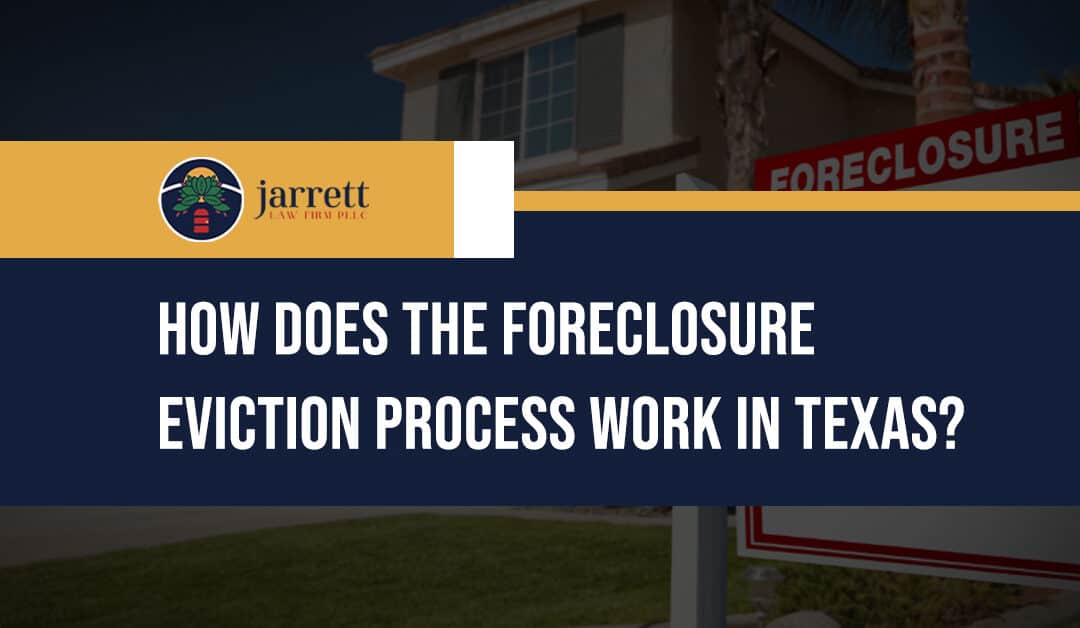Facing the difficult decision to foreclose on a property and initiate the eviction process is undoubtedly challenging. When a tenant can’t make their mortgage payments due to financial hardship or mortgage non-payment, eventually, something has to give. If you’ve financed a mortgage or lease-purchase agreement with someone who forgets their obligations, you may need help. Understanding the foreclosure eviction process is crucial for Texas mortgage holders who need to foreclose and evict a tenant.
“Roughly 1 in 15 current home borrowers—around 7 million U.S. adults—currently use alternative financing… such as land contracts, seller-financed mortgages, lease-purchase agreements, and personal property loans.” (1)
The foreclosure process includes serving notices, attending court hearings, and eventually evicting occupants. So we’ll highlight important considerations and potential challenges. Keep reading to find out more!
What is Foreclosure and Eviction in Texas?
Foreclosure and eviction are distinct processes when reclaiming possession of a property. The Lone Star State has unique rules and timelines for foreclosure and eviction. You’ll need to understand the legal requirements to navigate the process effectively.
In Texas, foreclosure refers to the legal procedure initiated by a mortgage holder to reclaim property. Usually, this happens because a borrower fails to meet their mortgage obligations. Foreclosure allows the mortgage holder to sell the property to recover the outstanding debt.
On the other hand, eviction, also known as forcible detainer, is the process by which the mortgage holder seeks to remove occupants. This process happens after the tenants go through facing foreclosure.
As the financing holder, you must pursue foreclosure and eviction when a tenant does not pay. Understanding the specific laws and procedures surrounding foreclosure and eviction in Texas allows you to move forward with clarity and purpose.
What Is the Foreclosure Process When Tenants Don’t Stay Up with Mortgage Payments?
In Houston, Texas, the foreclosure process follows a series of distinct steps. Here is a step-by-step breakdown of the process:
1- Notice of Default
First, you must issue a Notice of Default when a tenant falls behind on mortgage or financing payments. This written notice informs the tenant that they are in breach of their loan agreement and have a specific timeframe to rectify the situation.
2- Pre-Foreclosure Period
Following the Notice of Default, the tenant enters a pre-foreclosure period, typically around 120 days. During this time, the tenant can cure the default by bringing their payments up to date or working out a repayment plan with you.
3- Foreclosure Lawsuit
If the former owner or tenant fails to cure the default within the pre-foreclosure period, you may file a foreclosure lawsuit in the appropriate court. With the lawsuit, your goal is to obtain a court order allowing the foreclosure sale of the property.
4- Notice of Sale
Once the court approves the foreclosure, you can issue a Notice of Sale, which specifies the date, time, and location of the foreclosure sale. You’ll typically need to publish this in local newspapers and post it on the property.
5- Foreclosure Sale
The foreclosure sale usually occurs at the county courthouse or another public venue. The highest bidder wins the auction property and must generally pay in cash or certified funds. The winning bidder becomes the new owner of the property.
6- Redemption Period
The tenant may have a redemption period in Texas after the foreclosure sale. During this time, they can repurchase the property. They may do this by reimbursing the winning bidder for the sale price plus any associated costs.
7- Eviction Process
If the previous homeowner does not redeem the property during the redemption period, the new owner can proceed with eviction to remove the occupants.
Eviction typically involves serving an eviction notice, followed by court proceedings if the occupants refuse to vacate the house voluntarily. When someone refuses to leave, the legal term is “unlawful detainer.”
It is important to note that the foreclosure process and timelines may vary depending on the specific circumstances, local regulations, and any additional legal considerations.
As a financier needing to foreclose on a property in Houston, Texas, consulting with real estate legal professionals can help you fully understand your rights and options.
How Can a Real Estate Attorney Streamline the Foreclosure and Eviction Process for You?
Navigating Texas’s foreclosure and eviction process can be overwhelming and complex, but having a skilled real estate attorney by your side can significantly streamline the procedure.
Here are seven ways in which a real estate attorney can make the process of foreclosing on and evicting someone easier:
1- Expert Guidance
A knowledgeable attorney will provide expert guidance, explaining the intricacies of foreclosure, bankruptcy, and eviction and helping you understand your rights and obligations under Texas law.
2- Legal Compliance
Real estate attorneys ensure that all legal requirements and documentation are properly prepared, filed, and served, reducing the risk of procedural errors that could lead to delays or legal complications.
3- Timely Notice and Filing
By promptly serving notices and filing necessary documents with the appropriate courts, the service by a real estate attorney ensures compliance with strict deadlines, preventing unnecessary delays in foreclosure and eviction proceedings. They also ensure your filing fee’s timely payment.
4- Negotiations and Mediation
Skilled attorneys can negotiate and mediate with the mortgage holder or occupants. They explore alternative resolutions that may prevent the need for foreclosure and eviction. They also can mitigate potential disputes for peaceful resolutions.
5- Court Representation
If the case goes to court, an experienced real estate attorney will provide strong representation, presenting your case effectively and advocating for your rights and interests before the judge.
6- Documentation Preparation
Real estate attorneys assist in preparing the required legal documents, including foreclosure notices, eviction notices, court pleadings, and any necessary agreements or contracts. They ensure accuracy and completeness to avoid complications.
7- Alternative Solutions
In certain situations, a real estate attorney may identify alternative solutions, such as loan modifications, short sales, or “deed in lieu” of foreclosure options. These alternatives may provide a more favorable outcome for all parties involved.
By leveraging their expertise and experience, real estate attorneys offer invaluable support throughout the foreclosure and eviction process, simplifying complex legal matters and helping you navigate the challenges easily and efficiently.
Remember, foreclosure and eviction are highly nuanced and vary based on specific circumstances and local regulations. Consulting with a reputable real estate attorney in Texas is crucial to receive personalized guidance and tailored solutions for your unique situation.
Our Experienced Real Estate Attorneys Can Help
When it comes to the intricacies of the foreclosure and eviction process in Texas, the assistance of experienced real estate attorneys is invaluable. At Jarrett Law, our team of knowledgeable and skilled eviction attorneys guides you through every step. We provide expert advice, ensure legal compliance, and represent your interests with diligence and professionalism.
Contact us today for a consultation, and let our experienced real estate attorneys help you navigate this challenging process.

